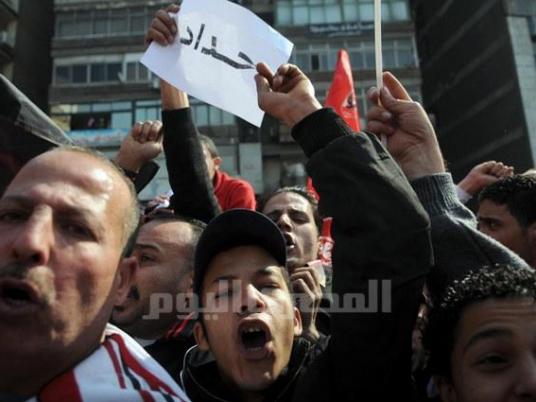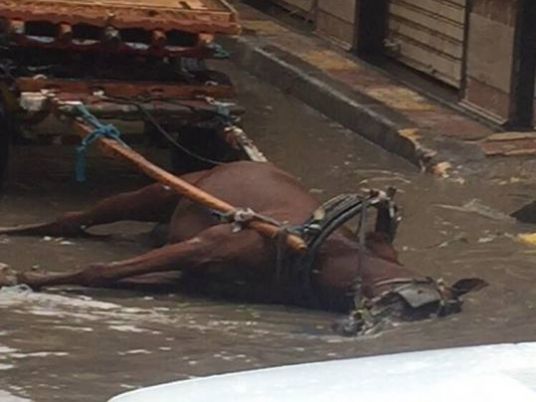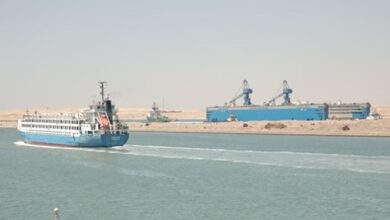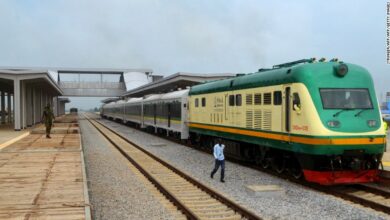
During the brief calm of a prayer-time ceasefire, as an imam delivered the Friday sermon in front of a cordon of riot police, a group of protestors gathered to discuss the most recent events that have reignited violence in downtown Cairo.
Protester Shawqy Shazly, standing meters from the garrisoned Interior Ministry, said that the death of at least 71 fans in a Port Said stadium Wednesday was the result of a deliberate neglect of security by the ruling military council, with the intent to create discord.
He said during the football clashes that took place in Mahalla on New Years Eve, police had successfully separated the two sides, preventing violence.
“In Port Said, however, the riot police oversaw what happened,” Shazly told Egypt Independent and his fellow protesters. “They don’t want the revolution to succeed.”
But though he had brought his motorbike to help carry wounded protesters, he said he didn’t approve of protesters most recent tactics.
“Unfortunately we [protesters] are running after the wrong things,” he said. “That Central Security soldier might be my brother, my cousin. We are calling for the heads of the big people – what has that soldier done wrong? He might be supporting an entire family.”
Pointing to a young boy looking up at him as he spoke, Shazly said, “There are children here, 10 and 15-year-olds, who have no conception of what a state means, what destruction means. “
“We have to keep a hold of ourselves,” he added. “They’re just trying to distract us with this so we run from here to there in clashes while they get on with doing what they want.”
Shazly and others demanded that power be transferred to a civilian president saying that they were fed up with military rule after 30 years and ready for democracy.
It was when Shazly referred to “a hidden hand” that Mahmoud Mohamed Abol Leil, who had been listening intently, interrupted.
Abol Leil announced that he had come from the “furthest southern village in Minya”. He asked Shazly who the hidden hand is, then answered his own question.
“It’s the person in charge of the presidency – and who is that?”
That would be Field Marshall Tantawi, head of the ruling Supreme Council of the Armed Forces, he said, who can rely on military intelligence forces, state intelligence, and State Security Investigations to carry out his secret designs.
Unlike Shazly, Abol Leil saw the clashes – which after 24 hours had resulted in one fatality and hundreds of injuries – as a necessity.
“The people have to stand united against the Field Marshall because he’s the hand of Hosni Mubarak,” he said. “If he won’t leave through peaceful action then it has to be through violence. Even if we have to beg, if we have to starve, we won’t let them run this country like they want to.”
Another protester, Sayyed, refused to give his full name but said that Public Prosecutor Abdel-Meguid Mahmoud was responsible for the state of the country because he has failed to hold wrongdoers to account. He hoped the newly elected parliament might prove better exactors of justice.
Sayyed reserved particular scorn for of Tantawi and his preferential decision to send airplanes to Port Said to rescue the Al-Ahly squad.
“There are bodies piled up on top of each other in the Zeinhom Morgue,” he said. “Where’s the justice? While they’re out enjoying themselves in their airplane others are fighting for their rights, treated like dogs, and can’t even find ambulances to transport them?”
Protester Abdel-Hamid, who also declined to give his full name, said he and other protesters do not intend to attack the Interior Ministry.
“We don’t want to storm the Interior Ministry,” he said. “We just want to put pressure on the government. We want freedom and social justice. We want to know why the people in Port Said died and who is behind their deaths.”
Several protesters insisted that calm will only come to Egypt if former President Hosni Mubarak is executed. The events at Port Said were calculated, they said, just like a series of recent crime incidents, including two armed robberies this week.
The aim, protester Emad Hamdy said, is to create chaos.
“They don’t want Mubarak to be issued a sentence and are hanging on to power to prevent this,” he said. “They are justifying staying in power by creating chaos and dividing the people.”




